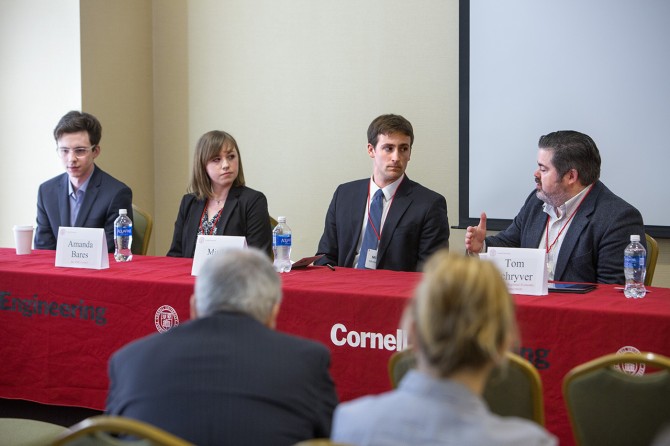Programs targeting students stress innovation, team building
By Joe Wilensky
By helping students think like entrepreneurs, programs like the Commercialization Fellows program in the College of Engineering can add another crucial level of practical knowledge to graduate student training. The program pairs engineering Ph.D. students with Johnson Graduate School of Management MBA students, mirroring “what both groups will encounter in industry: the critical interface of research and development with business acumen,” the program site states.
“It integrates the knowledge of what it takes to commercialize technology, and, it takes away some of the myths that we technologists are fed,” said Emmanuel Giannelis, Cornell’s vice provost for research and vice president for technology transfer, intellectual property and research policy. For example, most scientists or engineers believe that the best technology serves as the most likely determining factor in the success of a startup. But the best technology does not always win, he noted.
“Perhaps the best management team will be more successful,” he explained. “If you ask a venture capitalist, they will tell you the very first thing that they look at is the quality of the management team.”
As students go through programs like these, they “learn a lot about what it takes to build a successful company,” Giannelis said. “It all comes down to that idea of how you innovate. It’s the kind of thing that I wish we did more with our graduate students and postdocs: equipping them for what is often a very different world out there. Sometimes we sort of make it seem to be all technical, and it’s not all technical.”
“At the end of the day, it doesn’t matter if these students themselves start a company,” he said. Of the Commercialization Fellowship’s first cohort of six students, none started a company, he said. “But they all got great jobs.”
One student ended up working for a company that would have been a competitor of her startup, had she launched one. “And the reason she was able to land the job was because she knew so much about the business, about their technology,” he said. “She aced that interview.”
This story originally appeared in the fall 2020 issue of Ezra magazine.
Media Contact
Get Cornell news delivered right to your inbox.
Subscribe


